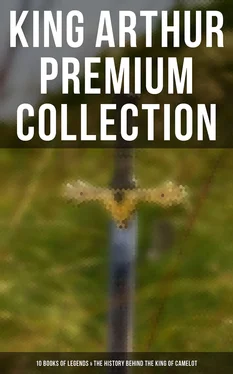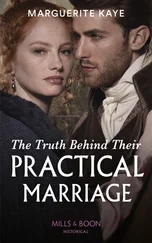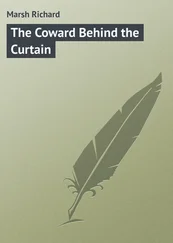Chapter XX.
How it was noised how Sir Tristram was dead, and how La Beale Isoud would have slain herself.
Table of Contents
Then Sir Andred, that was cousin unto Sir Tristram, made a lady that was his paramour to say and to noise it that she was with Sir Tristram or ever he died. And this tale she brought unto King Mark’s court, that she buried him by a well, and that or he died he besought King Mark to make his cousin, Sir Andred, king of the country of Liones, of the which Sir Tristram was lord of. All this did Sir Andred because he would have had Sir Tristram’s lands. And when King Mark heard tell that Sir Tristram was dead he wept and made great dole. But when Queen Isoud heard of these tidings she made such sorrow that she was nigh out of her mind; and so upon a day she thought to slay herself and never to live after Sir Tristram’s death. And so upon a day La Beale Isoud gat a sword privily and bare it to her garden, and there she pight the sword through a plum tree up to the hilt, so that it stuck fast, and it stood breast high. And as she would have run upon the sword and to have slain herself all this espied King Mark, how she kneeled down and said: Sweet Lord Jesu, have mercy upon me, for I may not live after the death of Sir Tristram de Liones, for he was my first love and he shall be the last. And with these words came King Mark and took her in his arms, and then he took up the sword, and bare her away with him into a tower; and there he made her to be kept, and watched her surely, and after that she lay long sick, nigh at the point of death.
This meanwhile ran Sir Tristram naked in the forest with the sword in his hand, and so he came to an hermitage, and there he laid him down and slept; and in the meanwhile the hermit stole away his sword, and laid meat down by him. Thus was he kept there ten days; and at the last he departed and came to the herdmen again. And there was a giant in that country that hight Tauleas, and for fear of Sir Tristram more than seven year he durst never much go at large, but for the most part he kept him in a sure castle of his own; and so this Tauleas heard tell that Sir Tristram was dead, by the noise of the court of King Mark. Then this Tauleas went daily at large. And so he happed upon a day he came to the herdmen wandering and langering, and there he set him down to rest among them. The meanwhile there came a knight of Cornwall that led a lady with him, and his name was Sir Dinant; and when the giant saw him he went from the herdmen and hid him under a tree, and so the knight came to that well, and there he alighted to repose him. And as soon as he was from his horse this giant Tauleas came betwixt this knight and his horse, and took the horse and leapt upon him. So forthwith he rode unto Sir Dinant and took him by the collar, and pulled him afore him upon his horse, and there would have stricken off his head. Then the herdmen said unto Sir Tristram: Help yonder knight. Help ye him, said Sir Tristram. We dare not, said the herdmen. Then Sir Tristram was ware of the sword of the knight thereas it lay; and so thither he ran and took up the sword and struck off Sir Tauleas’ head, and so he yede his way to the herdmen.
Chapter XXI.
How King Mark found Sir Tristram naked, and made him to be borne home to Tintagil, and how he was there known by a brachet.
Table of Contents
Then the knight took up the giant’s head and bare it with him unto King Mark, and told him what adventure betid him in the forest, and how a naked man rescued him from the grimly giant, Tauleas. Where had ye this adventure? said King Mark. Forsooth, said Sir Dinant, at the fair fountain in your forest where many adventurous knights meet, and there is the mad man. Well, said King Mark, I will see that wild man. So within a day or two King Mark commanded his knights and his hunters that they should be ready on the morn for to hunt, and so upon the morn he went unto that forest. And when the king came to that well he found there lying by that well a fair naked man, and a sword by him. Then King Mark blew and straked, and therewith his knights came to him; and then the king commanded his knights to: Take that naked man with fairness, and bring him to my castle. So they did softly and fair, and cast mantles upon Sir Tristram, and so led him unto Tintagil; and there they bathed him, and washed him, and gave him hot suppings till they had brought him well to his remembrance; but all this while there was no creature that knew Sir Tristram, nor what man he was.
So it fell upon a day that the queen, La Beale Isoud, heard of such a man, that ran naked in the forest, and how the king had brought him home to the court. Then La Beale Isoud called unto her Dame Bragwaine and said: Come on with me, for we will go see this man that my lord brought from the forest the last day. So they passed forth, and spered where was the sick man. And then a squire told the queen that he was in the garden taking his rest, and reposing him against the sun. So when the queen looked upon Sir Tristram she was not remembered of him. But ever she said unto Dame Bragwaine: Meseemeth I should have seen him heretofore in many places. But as soon as Sir Tristram saw her he knew her well enough. And then he turned away his visage and wept.
Then the queen had always a little brachet with her that Sir Tristram gave her the first time that ever she came into Cornwall, and never would that brachet depart from her but if Sir Tristram was nigh thereas was La Beale Isoud; and this brachet was sent from the king’s daughter of France unto Sir Tristram for great love. And anon as this little brachet felt a savour of Sir Tristram, she leapt upon him and licked his lears and his ears, and then she whined and quested, and she smelled at his feet and at his hands, and on all parts of his body that she might come to. Ah, my lady, said Dame Bragwaine unto La Beale Isoud, alas, alas, said she, I see it is mine own lord, Sir Tristram. And thereupon Isoud fell down in a swoon, and so lay a great while And when she might speak she said: My lord Sir Tristram, blessed be God ye have your life, and now I am sure ye shall be discovered by this little brachet, for she will never leave you. And also I am sure as soon as my lord, King Mark, do know you he will banish you out of the country of Cornwall, or else he will destroy you; for God’s sake, mine own lord, grant King Mark his will, and then draw you unto the court of King Arthur, for there are ye beloved, and ever when I may I shall send unto you; and when ye list ye may come to me, and at all times early and late I will be at your commandment, to live as poor a life as ever did queen or lady. O Madam, said Sir Tristram, go from me, for mickle anger and danger have I escaped for your love.
Chapter XXII.
How King Mark, by the advice of his council, banished Sir Tristram out of Cornwall the term of ten years.
Table of Contents
Then the queen departed, but the brachet would not from him; and therewithal came King Mark, and the brachet set upon him, and bayed at them all. There withal Sir Andred spake and said: Sir, this is Sir Tristram, I see by the brachet. Nay, said the king, I cannot suppose that. Then the king asked him upon his faith what he was, and what was his name. So God me help, said he, my name is Sir Tristram de Liones; now do by me what ye list. Ah, said King Mark, me repenteth of your recovery. And then he let call his barons to judge Sir Tristram to the death. Then many of his barons would not assent thereto, and in especial Sir Dinas, the Seneschal, and Sir Fergus. And so by the advice of them all Sir Tristram was banished out of the country for ten year, and thereupon he took his oath upon a book before the king and his barons. And so he was made to depart out of the country of Cornwall; and there were many barons brought him unto his ship, of the which some were his friends and some his foes. And in the meanwhile there came a knight of King Arthur’s, his name was Dinadan, and his coming was for to seek after Sir Tristram; then they showed him where he was armed at all points going to the ship. Now fair knight, said Sir Dinadan, or ye pass this court that ye will joust with me I require thee. With a good will, said Sir Tristram, an these lords will give me leave. Then the barons granted thereto, and so they ran together, and there Sir Tristram gave Sir Dinadan a fall. And then he prayed Sir Tristram to give him leave to go in his fellowship. Ye shall be right welcome, said then Sir Tristram.
Читать дальше












